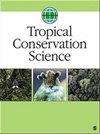Genetic Relationship Between Founders of a Threatened Freshwater Turtle in a Mexican Wildlife Management Unit. A Conservation Strategy
IF 1.6
4区 环境科学与生态学
Q2 BIODIVERSITY CONSERVATION
引用次数: 0
Abstract
Management Units for Wildlife Conservation (UMAs according to its Spanish acronym), are used for the ex-situ reproduction of freshwater turtles. These areas, often administered by local communities, are dedicated to conservation and sustainable management. The critically endangered freshwater turtle Dermatemys mawii has been successfully reproduced in several UMAs; however, no genetic management plan has been developed to maintain offspring genetic variability. Therefore, this study aims to determine the kinship relationship and homozygosity through the loci index of founder individuals in three UMAs devoted to the reproduction of D. mawii for the establishment of breeding groups. We collected skin samples of D. mawii in 2017 from 117 founder individuals from three UMAs located in the state of Tabasco, southeast Mexico. Ten specific D. mawii microsatellite markers were used for genotyping the founder individuals. We estimated the pedigree relationship between founders and proposed the formation of three breeding groups to optimize the use of related and non-related individuals to meet UMA-specific objectives and evaluated the genetic diversity retention of the breeding groups. The breeding groups were integrated as follows: 1) conservation breeding group consisting of 16 unrelated females and 7 unrelated males that presented a lower level of homozygosity (< 0.4); 2) research breeding group consisting of 45 females and 16 males that were unrelated or presented a half-sibling relationship and with a medium level of homozygosity (<0.6); and 3) a sustainable breeding group comprising 29 females and 4 males that were not necessarily unrelated and with a high level of homozygosity (> 0.6). Genetic diversity retention (Ho, He) was highest for the conservation breeder group and research breeder group. UMAs can create 3 breeding groups with different objectives: 1) species conservation, 2) research, and 3) sustainable use of species. All breeding groups can retain genetic diversity. Our proposal can enrich conservation actions and sustainable use for D. mawii at both national and international levels, specifically within the Mesoamerican corridor.墨西哥野生动物管理单位一只受威胁淡水龟创始人之间的遗传关系。保护策略
野生动物保护管理单位(UMA,根据其西班牙语首字母缩写)用于淡水龟的迁地繁殖。这些地区通常由当地社区管理,致力于保护和可持续管理。极度濒危的淡水龟Dermatemys mawii已在多个UMA中成功繁殖;然而,目前还没有制定出保持后代遗传变异性的遗传管理计划。因此,本研究旨在通过对三个致力于马维属繁殖的UMA中创始个体的基因座指数来确定亲缘关系和纯合性,以建立繁殖群。2017年,我们从墨西哥东南部塔巴斯科州三个UMA的117名创始人身上采集了D.mawii的皮肤样本。使用10个特异性的D.mawii微卫星标记对创始个体进行基因分型。我们估计了创始人之间的谱系关系,并建议组建三个繁殖群,以优化相关和非相关个体的使用,以满足UMA的特定目标,并评估了繁殖群的遗传多样性保留率。繁殖组整合如下:1)保护性繁殖组,由16只不相关的雌性和7只表现出较低纯合子水平(<0.4)的不相关雄性组成;2) 研究育种组由45只雌性和16只雄性组成,它们没有亲缘关系或表现出半兄弟关系,纯合子水平中等(0.6)。遗传多样性保留率(Ho,He)在保护育种组和研究育种组中最高。UMA可以创建3个具有不同目标的繁殖群体:1)物种保护,2)研究,以及3)物种的可持续利用。所有繁殖群体都能保持遗传多样性。我们的建议可以丰富国家和国际层面,特别是中美洲走廊内的D.mawii保护行动和可持续利用。
本文章由计算机程序翻译,如有差异,请以英文原文为准。
求助全文
约1分钟内获得全文
求助全文
来源期刊

Tropical Conservation Science
BIODIVERSITY CONSERVATION-
CiteScore
3.60
自引率
5.90%
发文量
16
审稿时长
>12 weeks
期刊介绍:
Tropical Conservation Science is a peer-reviewed, open access journal that publishes original research papers and state-of-the-art reviews of broad interest to the field of conservation of tropical forests and of other tropical ecosystems.
 求助内容:
求助内容: 应助结果提醒方式:
应助结果提醒方式:


